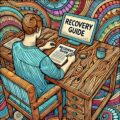Histamine Intolerance Linked to Mold Mycotoxins
 Over the last several years, I’ve worked with plenty of clients who have had histamine intolerance. At first, I thought it was all driven by gut issues, infections, and dietary irritants. Though that was true to some degree, I neglected to consider air quality. This continued until I finally realized the significance of mold/mycotoxins after healing my daughter. Once this happened, I could finally see the full picture. In cases where I would’ve struggled before, now I was having success.
Over the last several years, I’ve worked with plenty of clients who have had histamine intolerance. At first, I thought it was all driven by gut issues, infections, and dietary irritants. Though that was true to some degree, I neglected to consider air quality. This continued until I finally realized the significance of mold/mycotoxins after healing my daughter. Once this happened, I could finally see the full picture. In cases where I would’ve struggled before, now I was having success.
In this article, I will discuss how mycotoxin exposure can increase your risk for histamine intolerance. Afterward, I will discuss several common questions about mycotoxins and histamine intolerance. This will give you the complete picture of histamine intolerance in a way that has never been explained before. Scroll down to get started!
How Mycotoxins Cause Histamine Intolerance
Makes Mast Cells Secrete Histamine
Mycotoxin exposure causes the mast cells to secrete histamine and other inflammatory chemicals. In addition, it makes these cells extremely aggressive, leading them to react abnormally to nearly anything they encounter. For example, when my daughter was in a house with mold, she would have asthma attacks just from pineapple juice. This is because it contained histamine, and since her body was so high in it already, it couldn’t tolerate it anymore. After we left the moldy house, she could tolerate it with no problem now.
Impairs Kidney Function
Often, people with histamine intolerance are consuming animal products multiple times per day. The problem is, most people with histamine intolerance have a tough time breaking down protein due to insufficient stomach acid. This leads to undigested proteins, which causes stress on the kidneys. When you add mycotoxins into the mix, you have a recipe for disaster. Since the undigested proteins compromise the kidneys, the mycotoxins accumulate and cause significant dysfunction in the detoxification system. This leads the immune system to become even more reactive, secreting histamine after nearly any meal.
Protein Digestion Compromised
As mentioned above, protein digestion can be compromised when you have histamine intolerance. This can occur for several reasons, but one of the most common is mycotoxin exposure. The reason is, mycotoxins have been shown to disrupt the protein assimilation process. Unfortunately, most people who have histamine intolerance are consuming a lot of protein every day. This leads them into a trap, where their detoxification system gradually becomes more impaired over time. Also, the undigested proteins aggravate the gut lining, which makes food sensitivities even worse. Both of these things lead to aggravated mast cells, which now release even more histamine.
Causes Leaky Gut Syndrome
Recent studies have shown that mycotoxins cause inflammation in the gut lining. They can also disrupt the replication of beneficial bacteria, which is essential for maintaining the integrity of the intestinal barrier. If you are exposed continuously to mycotoxins, you can eventually develop a bad case of leaky gut. In this situation, food particles leak into the bloodstream, which triggers the immune system, creating systemwide dysfunction.
This is the absolute last thing you want if you are attempting to recover from histamine intolerance. For years, I thought that a leaky gut was all about what you were putting in your mouth or what you were taking. I never, in one million years, thought it had to do with what I was inhaling. Once I left the moldy house, my gut felt better than ever. I have also seen this with my daughter and many clients.
Upregulates Pathogenic Activity
Mycotoxin exposure can cause the immune system to become dysfunctional. When it does, molecular signals are sent out through the blood. When the pathogens sense these molecules, they know it is a good time to replicate or translocate. This is why it is so important to rule out mold when you have histamine intolerance. You don’t want to target a pathogen if it isn’t the root cause.
I see people do this all the time, and by making this choice, they do further damage to their gut microbiome and immune system. This causes histamine levels to rise even further, aggravating symptoms. Rather than chase the pathogen, eat the right foods and make sure your environment is free of mycotoxins. This will get you a lot further in the long run if you have symptoms of histamine tolerance.
Blocks Growth of Beneficial Bacteria
Mold mycotoxins have been shown to block the growth of beneficial bacteria like lactobacillus and bifidobacterium. When this occurs, it allows pathogenic bacteria to take control. Many of these bacteria are histamine-producing strains, which then causes levels to rise even further. This starts a domino effect in the gut that is hard to escape. To grow your beneficial bacteria back, you must eliminate the mycotoxins in your stomach and prevent further exposure. If you don’t, you could be stuck in this histamine intolerance trap forever.
Disrupts Neurotransmitter Balance
Exposure to mold mycotoxins can disrupt your neurotransmitters. Typically, people with mycotoxin illness have too much norepinephrine and dopamine. In addition, they have a reduction in levels of serotonin and GABA. This causes the body to remain in a constant state of stress. Pushing the body further into fight or flight increases the likelihood of histamine secretion by the mast cells. To regain control, you must eliminate exposure and retrain the limbic system through meditation/slow deep breathing and other regenerative practices.
Stresses the Liver/Gallbladder
When the body is exposed to mycotoxins, it can cause dysfunction in the liver. The reason is, the mycotoxins can cause liver inflammation and aggravate the gut lining. This allows bacterial by-products and food particles to enter the bloodstream. When this occurs, it puts the liver into a state of shock. In essence, all operations halt, and toxins build up within. In terms of the gallbladder, mycotoxins cause the bile to become sludgy. This leads to improper digestion of fats and further issues with the gut lining. All these cause stress on the mast cells, which then secrete more histamine, reinforcing the inflammatory cycle.
Other Causes of Histamine Intolerance
Too Many Animal Products
Typically, people who have histamine intolerance are consuming animal products multiple times per day. Though they think they are doing themselves a favor, they are turning their gut microbiome into a histamine-producing machine over the long term. Unfortunately, the bacteria that like to digest meat are the same ones that produce histamine. In contrast, the ones that regulate histamine are fed by plant fiber. If you consume more animal products than you do plant fiber, then you will have a histamine-dominant environment. The solution is simply emphasizing plants and minimizing animal products until things get under control.
Food Sensitivities
People who have histamine intolerance often have digestive insufficiencies. The makeup of their gut microbiome causes this, as well as what they are currently being exposed to. First, protein digestion becomes impaired. This is because it is the most complex process, which requires the most digestive effort. Then, the digestion of fats becomes compromised. When these things occur, leaky gut syndrome is inevitable. This causes the person to develop various food sensitivities because the proteins in these foods are not broken down properly, and they leak into the blood. This causes the immune system to develop a food sensitivity, triggering symptoms for the individual.
Supplements/Medication
Many people with histamine intolerance are on medication or supplements that are aggravating their symptoms. There are a few things people don’t understand about taking supplements and medication while you have histamine intolerance. First, anything synthetic is a risk. The reason is, the immune system will eventually recognize that it is unnatural. At that point, it will start to react to it and cause symptoms.
Next, if you have histamine intolerance, you never want to take supplements every day. This sets you up for developing a sensitivity that you may not recognize. Since the supplement felt like it helped initially, you don’t think it could be one of the things aggregating your symptoms. This leads you into a cycle where you continue to use it and cause your body to secrete histamine every time.
Bacterial Overgrowth
When you have an overgrowth of bacteria and parasites in your gut, the immune system will become overreactive. The reason is that when they break down the food that you are eating, they will produce byproducts that tell the immune system they are there. When this occurs, the mast cells are likely to secrete histamine consistently. Also, many of these harmful bacteria or histamine-producing strains. This means you have bacteria in your gut and mast cells that produce histamine simultaneously. This leads to a histamine excess, which causes HIT symptoms to develop.
History of Antibiotic Use
Antibiotics can severely disrupt the gut microbial community. If you take antibiotics and eat a diet that is high in animal products and processed foods, your bacteria can become unbalanced. The reason is that these foods feed histamine-producing bacteria in your gut. This is precisely what happened to me. Though it didn’t take one course of antibiotics, it took years of administration. Nonetheless, I see plenty of clients who experience histamine intolerance shortly after a course of antibiotics. To restore the body after the damage, you must change your diet and emphasize probiotics like bifidobacterium, as well as prebiotics like acacia, apple pectin, and arabinogalactan.
Vaccine Related Injuries
I have seen plenty of people who have had vaccine-related injuries. When this occurs, the mast cells and regulatory T cells become dysfunctional, causing the immune system to react defensively. Now, anything inhaled or consumed is considered a potential threat to the body. This is the common story of histamine intolerance and mast cell activation.
Though I ended up in this situation, it was not caused by vaccine injury. Regardless, the path back to wellness is the same. You must go through the elimination diet to determine what foods REALLY work for you. After, you must optimize air quality like you’ve never done before in your life. Lastly, implement a good stress reduction practice into your daily routine. My favorite is slow deep breathing. By doing all of these things, you can overcome most of the histamine intolerance symptoms without needing supplements.
FAQ – Mold Mycotoxins and Histamine Intolerance
Are mold mycotoxins common with histamine intolerance?
Yes, mold toxins are the most common cause of severe histamine intolerance. If someone has minor symptoms, then maybe other things are more important. In contrast, if you have significant symptoms of histamine intolerance, it’s almost a guarantee that mold is involved. There are NOT many things in this world that will aggravate the immune system this much. Unfortunately, one of them is mold, and we have to live around it every day. For this reason, you must be extra safe if you are battling symptoms of histamine intolerance.
What diet will help you overcome histamine intolerance?
The best diet for histamine intolerance is actually not the low histamine diet! The reason is, most people will still consume too many animal products while on the low histamine diet. For the best results, you want to implement an elimination diet strategy. First, you start with the foods that are easiest for the gut to break down (“green foods”). Next, you move up to the foods that are harder to break down. Last, you add the foods that are hardest to break down. If you do this methodically, you can identify which foods agree with you and which cause your symptoms. This is the strategy I’ve used for years to figure out complex chronic illnesses.
Which mycotoxin is most common with histamine intolerance?
The mycotoxin group which is most often linked to histamine intolerance are the trichothecenes. These are the worst of the worst when it comes to mycotoxins. Unfortunately, they are also relatively common because they are produced by molds which love water leaks. Even after the water damage has been cleaned up, the mycotoxins can still remain. If you are having severe histamine intolerance symptoms, you are likely being exposed to trichothecenes or some other mycotoxin. Trust me, if anyone knows, it’s me. I went through this and saw my daughter go from disabled to symptom-free by changing ONLY her indoor air quality.
Is limbic system retraining important for histamine intolerance?
When you have histamine intolerance, your mind typically feels like it’s on hyperdrive. If you feel stressed, remember that your immune system is more likely to be triggered by something you eat or inhale. In contrast, your immune system is much less likely to be triggered if you feel relaxed and safe. I do believe in limbic system retraining, but I think it is most effective once you have eliminated all of your dietary and environmental triggers.
Also, you must be willing to address the underlying stress triggers in your life. If you don’t, it’s hard for the limbic system retraining to stick. Every time you see something that reminds you of your trauma, you will just be triggered back into a stressful experience. This is why it’s essential to change the story surrounding the drama. Otherwise, it will control you and produce a future that resembles your past. My favorite method of limbic system retraining is a combination of meditation/slow deep breathing. To learn more, click on the link provided.
Do I have experience with mold mycotoxins and histamine intolerance?
Absolutely! I lived in a house with black mold for close to three years. During that time, I had some strange health issues that popped up. I had severe pain on my right side for years, a tough time breaking down proteins, rings under my eyes, fatigue, and frequent infections. I was confused because I had gotten better years earlier, and I was going backward even though I was making the right decisions. At the same time, I was watching my daughter get worse and worse. She had neurological issues, seizures, severe eczema, food allergies, facial flushing, learning disabilities, convulsions in her sleep, slurred speech, memory issues, eyes crossing, and plenty more.
Once I eventually identified that mold was the problem for both, we moved into a hotel to test the theory. Within a few weeks, we noticed that we were feeling somewhat better. I then found a place that we tested, and it was free of toxic mold. Once we moved in, both of our symptoms disappeared within a few months. It was mind-blowing! The more I worked with new clients, the more their stories sounded like mine. This is when I realized that most practitioners were blind to this all and were misdiagnosing patients by the boatloads. Even if they were brilliant, they just hadn’t experienced what I went through.
Conclusion – Mold Mycotoxins Often Drive Histamine Intolerance
In nearly every case of histamine intolerance, there has been some mold exposure. The reality is, it has to be severe immune dysfunction for histamine levels to go through the roof. There are only a few reasons this can occur, and one of the most common is mycotoxin hypersensitivity.
I have personally experienced mycotoxin poisoning and seen my daughter go through it, along with plenty of clients. Though everyone with histamine intolerance thinks mold isn’t a contributing factor, unfortunately, it usually is. Do yourself a favor and investigate mycotoxins further. It may be one of the best decisions you ever made. I know it sure was for me. If I hadn’t, my daughter would still be disabled today!
If you have any questions about histamine intolerance or mycotoxins, get in touch. I’m willing to help and blessed to have the opportunity.
Happy healing everyone!
Matt Nedin
Certified Holistic Nutritionist
EndSickness, Founder
Phone: (734) 846-8619
Email: endsickness@gmail.com
WhatsApp/Telegram: +17348468619












